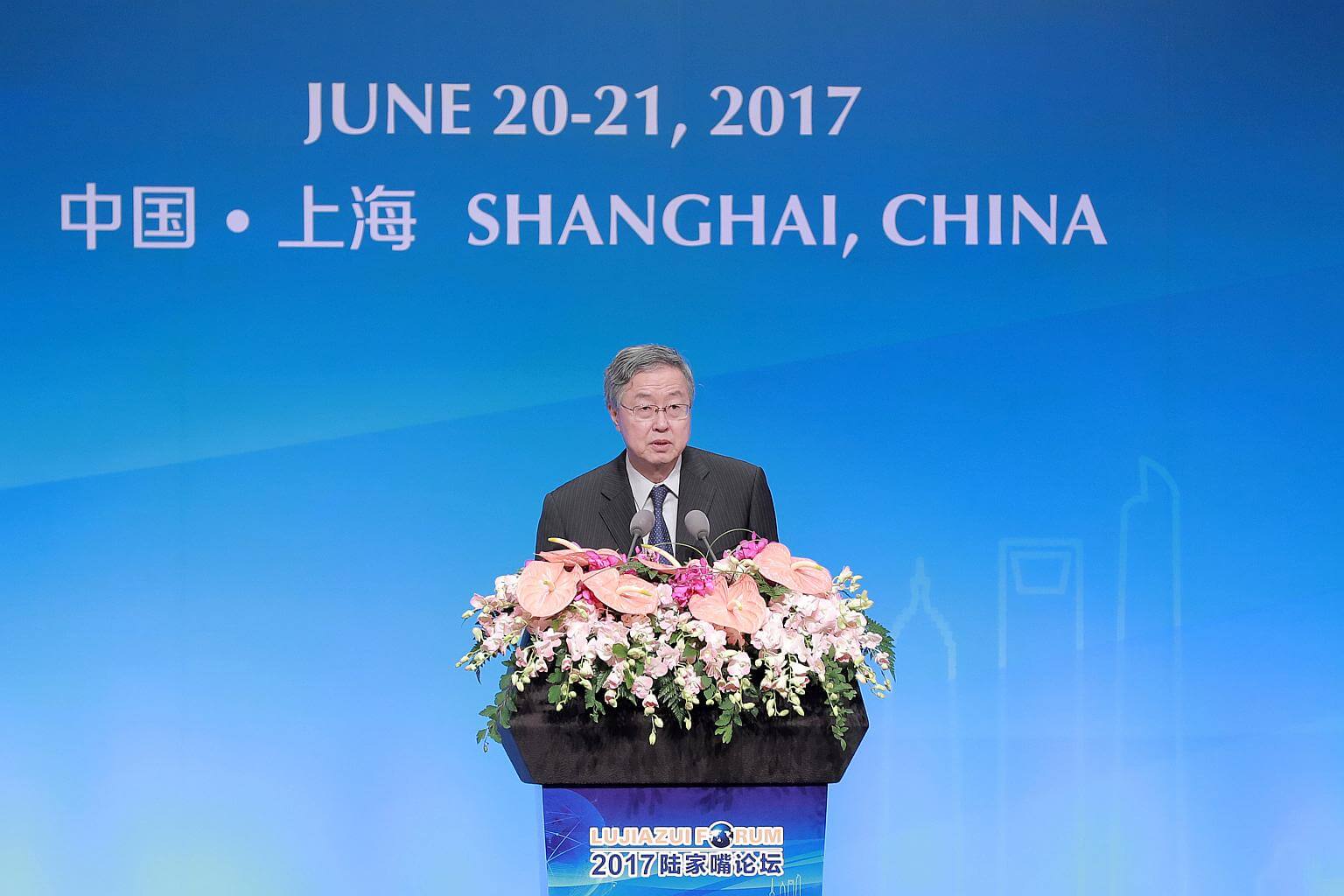China central bank boss calls for reform amid party congress countdown
Sign up now: Get insights on Asia's fast-moving developments

China's central bank governor Zhou Xiaochuan delivers a speech during the annual Lujiazui Forum in Shanghai, on June 20, 2017.
PHOTO: REUTERS
Follow topic:
BEIJING (BLOOMBERG) - People's Bank of China Governor Zhou Xiaochuan made a fresh call to open up the nation's financial sector, and warned that reform will become more difficult if the window of opportunity is missed.
In an interview published late on Monday (Oct 9) with the Chinese financial magazine Caijing, the nation's longest-serving central bank chief defined a "troika" of three drivers needed to further open up the economy, citing greater foreign trade and investment, a more market-based foreign-exchange rate mechanism with a "reasonable and balanced" yuan rate, and the relaxation of capital controls to allow use of the yuan to be gradually freed.
In timing his intervention just before China's Communist Party hunkers down for its once-in-five years leadership transition next week, Mr Zhou is burnishing his position as an advocate of financial openness in the months before his expected retirement.
While China has ambitions to make its currency a global means of exchange, the world's second-largest economy still operates behind a barrier of exchange controls and restrictions on foreign investment.
"There isn't a single country in the world that can achieve open economy with strict foreign exchange controls," Mr Zhou said in the wide-ranging interview, which looked back at the country's financial and currency reforms over decades and marked one year since the International Monetary Fund added the yuan as the fifth component of its reserve-currency basket.
"The time window is very important for reforms, an appropriate window must be seized. Once missed, the cost of reform will be higher in the future," he said.
Since taking the central bank's reins in December 2002, Mr Zhou has steered the nation through global crises, overhauled monetary policy tools, ended a direct peg to the dollar, abolished a cap on deposit rates and overseen the elevation of the yuan to reserve-currency status.
"The main message of Zhou's interview is that China has passed the point of no return," said Mr Raymond Yeung, chief economist for Greater China at Australia & New Zealand Banking Group in Hong Kong. "After 40 years of opening-up policy, foreign participation in the financial industries has not been up to speed, requiring a bold reform to take it forward."
The yuan joined the US dollar, euro, yen and pound in the IMF's Special Drawing Rights basket last year on Oct 1, the anniversary of the founding of the People's Republic, marking a key accomplishment for Mr Zhou, who has long been seen as one of the nation's chief reformers.
But while that reflected rising economic clout after years of financial liberalisation, the leaders of the world's second-largest economy soon clamped down on cross-border transactions to help prop up the weakening currency.
Swift data show global transactions using yuan fell to 1.94 per cent in August, down from a record 2.79 per cent two years earlier.
"Opening-up needs to be pushed ahead further, and we could take bigger steps to increase the market access for financial institutions and the opening-up of the financial market," Mr Zhou said. "Foreign financial institutions have very little market share in China, and from stock- and bond-link trials, people are learning and improving, and they will find that the risks are not as enormous as they thought."
While it is widely expected that Mr Zhou will retire, there are no guarantees as China's political appointments are often unpredictable. The PBOC chief bucked expectations he would leave back when he was 65. Instead he was promoted, taking on the title of vice-chairman of the Chinese People's Political Consultative Conference, where the retirement age typically is 70. Mr Zhou turns 70 in January.
"It seems there is a concerted push from within the PBOC to liberalise the capital account and exchange rate a bit while the yuan is relatively strong," said professor Victor Shih at the University of California in San Diego, who studies China's politics and finance. "The conservative views of the higher leadership may stand in the way of significant progress."

